Compilation of 400+ adjectives with prepositions in English
Adjectives are often accompanied by prepositions to express a complete meaning. Each adjective paired with a different preposition conveys distinct meanings. Below are the most common adjectives with prepositions in English that you should remember to use correctly.
- I. Compilation of common adjectives with prepositions
- 1. Adjective followed by preposition "at"
- 2. Adjective followed by preposition "about"
- 3. Adjective followed by preposition "by"
- 4. Adjective followed by preposition "from"
- 5. Adjective followed by preposition "for"
- 6. Adjective followed by preposition "to"
- 7. Adjective followed by preposition "of"
- 8. Adjective followed by preposition "on"
- 9. Adjective followed by preposition "in"
- 10. Adjective followed by preposition "with"
- II. Tips for effectively learning adjectives with prepositions
- III. Adjectives and prepositions exercises
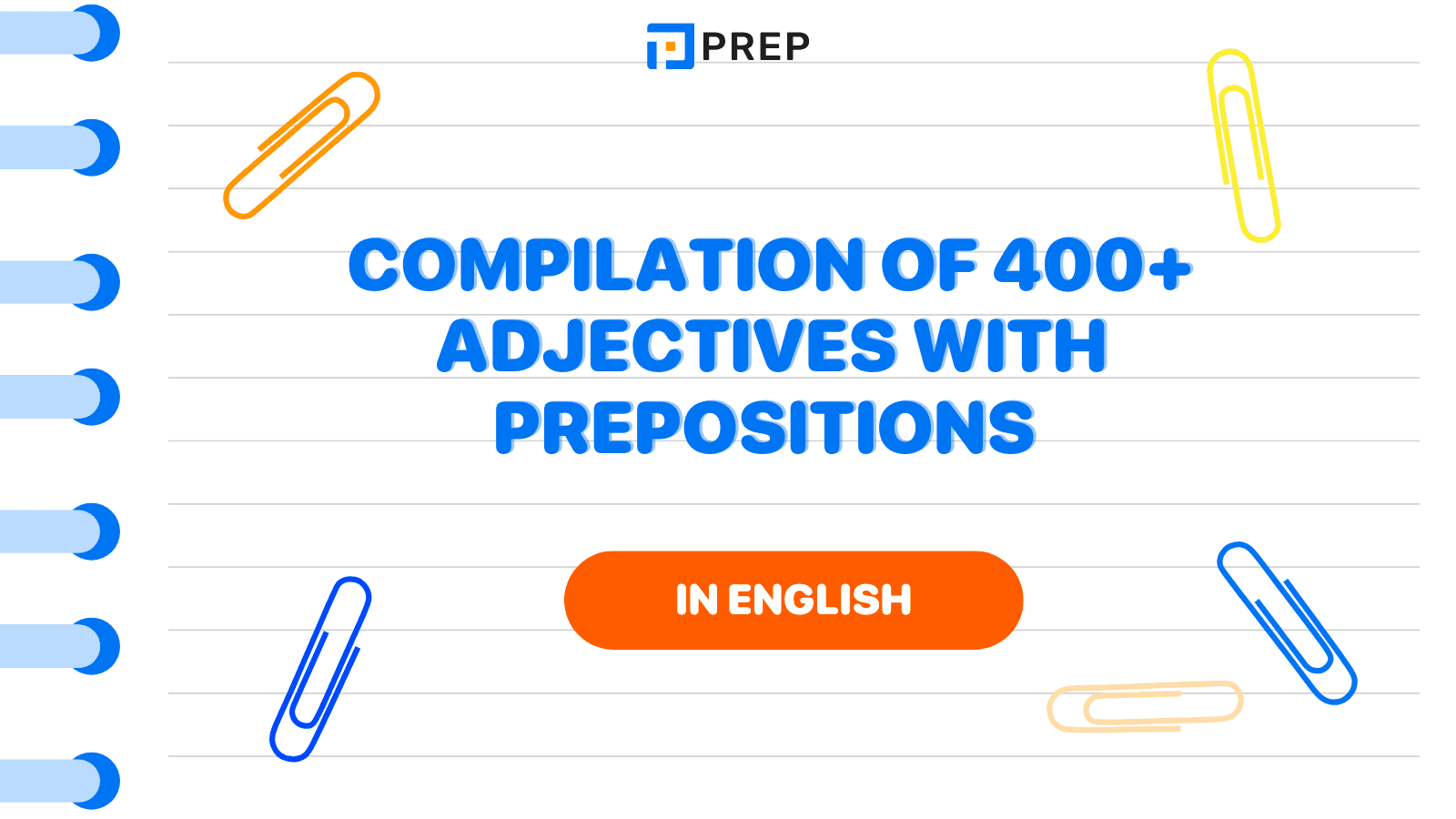
I. Compilation of common adjectives with prepositions
Below is a compilation of common adjective and preposition combinations, along with clear examples for better understanding of their usage. Make sure to save it for future reference!
1. Adjective followed by preposition "at"
Here are some commonly encountered Adjective followed by preposition "at":
|
Adjective followed by preposition "at" |
Pronunciation |
Meaning |
Adjective and preposition examples |
|
amazed at |
/əˈmeɪzd æt/ |
very surprised |
Maris is amazed at learn the truth about her boyfriend. |
|
amused at |
/əˈmjuːzd æt/
|
thinking that somebody/something is funny, so that you smile or laugh |
Lisa seems amused at the newly purchased camera. |
|
angry at st |
/ˈæŋ.ɡri æt/
|
having strong feelings about something that you dislike very much or about an unfair situation |
My mother is angry at my father because he smokes. |
|
annoyed at |
/əˈnɔɪ æt/
|
slightly angry |
I'm very annoyed at the noise from my neighbor. |
|
bad at |
/bæd æt/
|
of poor quality; below an acceptable standard |
I am bad at Math. |
|
good/clever at |
/ɡʊd/ˈklevə(r) æt/
|
quick at learning and understanding things |
I am good at Literature. |
|
efficient at |
/ɪˈfɪʃnt æt/
|
doing something in a good, careful and complete way with no waste of time, money or energy |
Marios is efficient at leadership ability so he was promoted. |
|
expert at |
/ˈekspɜːt æt/
|
done with, having or involving great knowledge or skill |
My company requires employees to be experts at office information technology. |
|
indignant at |
/ɪnˈdɪɡnənt æt/
|
feeling or showing anger and surprise because you think that you have been treated unfairly |
I am indignant at people who are prone to domestic violence. |
|
mad at |
/mæd æt/
|
having a mental illness that makes somebody unable to think or behave normally |
David was mad at his girlfriend because she canceled the date. |
|
sad at |
/sæd æt/
|
unhappy or showing unhappiness |
Mike was sad at couldn't go on a trip with his friends. |
|
slow at |
/sləʊ æt/
|
not moving, acting or done quickly; taking a long time; not fast |
I'm slow at computing. |
|
skillful at |
/ˈskɪlfl æt/
|
(of a person) good at doing something, especially something that needs a particular ability or special training |
My girlfriend is skillful at the field of behavior. |
|
surprised at |
/səˈpraɪzd æt/
|
feeling or showing surprise |
Lacy is surprised at a birthday gift from her ex-boyfriend. |
|
quick at |
/kwɪk æt/
|
done with speed; taking or lasting a short time |
Lucy is very quick at receiving money. |
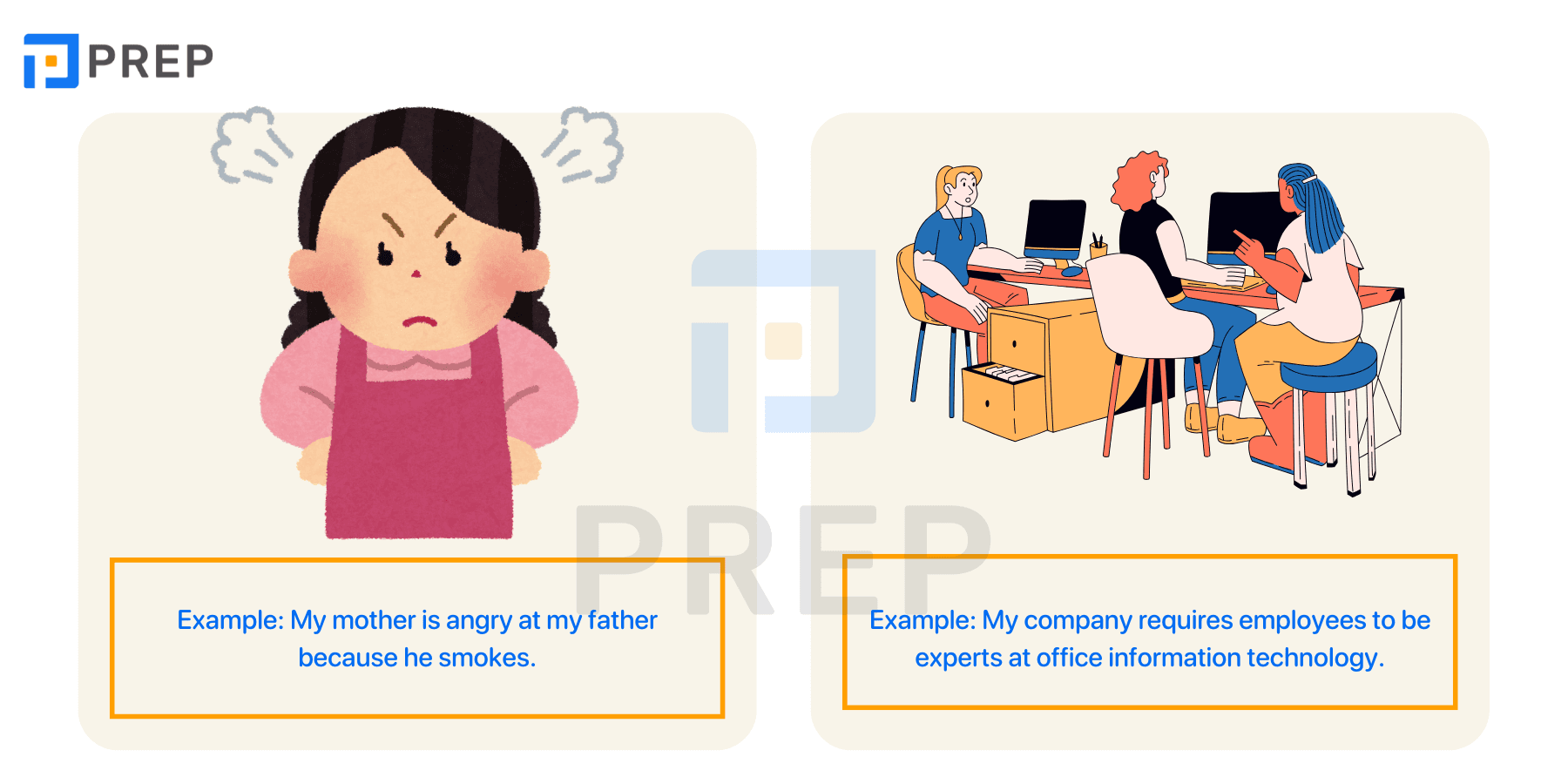
2. Adjective followed by preposition "about"
Adjective followed by preposition "about" include the following common words:
|
Adjective followed by preposition "about" |
Pronunciation |
Meaning |
Adjectives prepositions examples |
|
angry about |
/ˈæŋɡri əˈbaʊt/ |
having strong feelings about something that you dislike very much or about an unfair situation |
My girlfriend is angry about not having a Christmas gift. |
|
anxious about |
/ˈæŋkʃəs əˈbaʊt/
|
feeling worried or nervous |
Miley is anxious about personal information being leaked. |
|
enthusiastic about |
/ɪnˌθjuːziˈæstɪk əˈbaʊt/
|
feeling or showing a lot of excitement and interest about somebody/something |
I'm enthusiastic about this weekend's trip. |
|
excited about |
/ikˈsaɪtɪd əˈbaʊt/
|
feeling or showing happiness and enthusiasm |
My sister was excited about coming to Hanoi to visit me. |
|
furious about |
/ˈfjʊəriəs əˈbaʊt/
|
very angry |
My boss is furious about me taking time off without permission. |
|
happy about |
/ˈhæpi əˈbaʊt/
|
feeling or showing pleasure; pleased |
My mother is happy about celebrating her birthday. |
|
mad about |
/mæd əˈbaʊt/
|
very stupid; not at all sensible |
She was mad about not being invited to the party. |
|
nervous about |
/ˈnɜːvəs əˈbaʊt/
|
anxious about something or afraid of something |
Linda is nervous about taking the final exam. |
|
pessimistic about |
/ˌpesɪˈmɪstɪk əˈbaʊt/
|
expecting bad things to happen or something not to be successful; showing this |
David is pessimistic about applying for a job during these difficult times. |
|
sad about |
/sæd əˈbaʊt/
|
unhappy or showing unhappiness |
Racy is sad about not being invited to her best friend's birthday party. |
|
serious about |
/ˈsɪəriəs əˈbaʊt/
|
bad or dangerous |
Mary is getting serious about painting. |
|
upset about |
/ˌʌpˈset əˈbaʊt/
|
unhappy or disappointed because of something unpleasant that has happened |
Doly is upset about failing the university entrance exam. |
|
worried about |
/ˈwʌrid əˈbaʊt/
|
thinking about unpleasant things that have happened or that might happen and therefore feeling unhappy and afraid |
Devil is very worried about his girlfriend after the accident. |
|
sorry about |
/ˈsɒri əˈbaʊt/
|
feeling sad and ashamed about something that has been done |
I am sorry about not telling you the truth sooner. |
|
curious about |
/ˈkjʊəriəs əˈbaʊt/
|
having a strong desire to know about something |
Linda is very curious about her boyfriend's family background. |
|
doubtful about |
/ˈdaʊtfl əˈbaʊt/
|
not sure; uncertain and feeling doubt |
Aurora was doubtful about my reason for approaching her. |
|
reluctant about |
/rɪˈlʌktənt əˈbaʊt/
|
hesitating before doing something because you do not want to do it or because you are not sure that it is the right thing to do |
I'm always reluctant about using other people's things. |
|
uneasy about |
/ʌnˈiːzi əˈbaʊt/
|
feeling worried or unhappy about a particular situation, especially because you think that something bad or unpleasant may happen or because you are not sure that what you are doing is right |
Lina was uneasy about me using her phone. |
3. Adjective followed by preposition "by"
Adjective followed by preposition "by" include the following basic words:
|
Adjective followed by preposition "by" |
Pronunciation |
Meaning |
Adjective and preposition examples |
|
amazed by |
/əˈmeɪzd baɪ/ |
very surprised |
Ciara was amazed by the beauty of this river. |
|
delighted by |
/dɪˈlaɪtɪd baɪ/ |
very pleased |
Clara was delighted by meet her old best friend after many years of separation. |
|
disturbed by |
/dɪˈstɜːbd baɪ/ |
mentally ill, especially because of very unhappy or unpleasant experiences |
I was disturbed by confessed. |
|
excited by |
/ɪkˈsaɪtɪd baɪ/ |
feeling or showing happiness and enthusiasm |
Students are excited by the field trip. |
|
fascinated by |
/ˈfæsɪneɪtɪd baɪ/ |
very interested |
Donna is excited about her new dress. |
|
impressed by |
/ɪmˈprest baɪ/ |
admiring somebody/something because you think they are particularly good, interesting, etc. |
I was impressed by his handsome features. |
|
inspired by |
/ɪnˈspaɪəd baɪ/ |
having excellent qualities or abilities; produced with the help of inspiration |
Doris is inspired by her boss's success. |
|
shocked by |
/ʃɒkt baɪ/ |
surprised and upset; showing that somebody feels surprised and upset |
I'm shocked by my boyfriend's wealth. |
|
surprised by |
/səˈpraɪzd baɪ/ |
feeling or showing surprise |
Clara was surprised by her score, which was higher than she expected. |
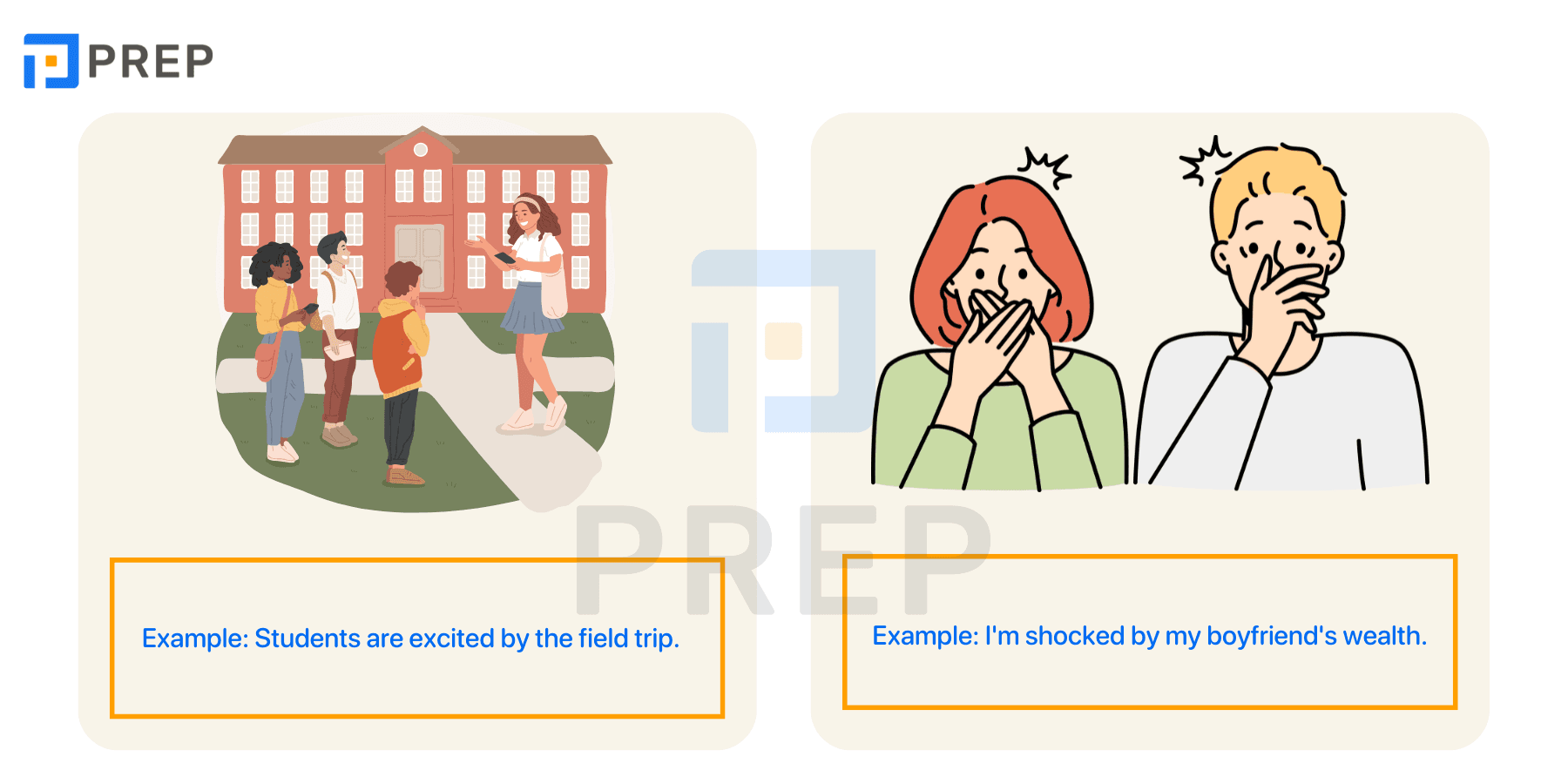
4. Adjective followed by preposition "from"
Here is a list of commonly encountered Adjective followed by preposition "from" that you should remember:
|
Adjective followed by preposition "from" |
Pronunciation |
Meaning |
Adjectives prepositions examples |
|
Made from |
/meɪd frəm/ |
To be produced from a material |
This table is made from wood. |
|
Different from |
/ˈdɪfrənt frəm/ |
not the same as somebody/something; not like somebody/something else |
Clara is different from her sister, she is much stronger. |
|
Safe from |
/seɪf frəm/ |
protected from any danger, harm or loss |
Ha Noi City was safe from attack. |
|
Absent from |
/ˈæbsənt frəm/ |
not in a place because of illness, etc. |
Kevin was absent from school yesterday. |
|
Free from |
/friː frəm/ |
without particular plans or arrangements; not busy |
Eira is free from pain. |
|
Tired from |
/ˈtaɪəd frəm/ |
feeling that you would like to sleep or rest; needing rest |
Heidi is tired from studying, so she's going to take a nap. |
5. Adjective followed by preposition "for"
Here is a compilation of some adjectives commonly used with the preposition "for" that you should remember:
|
Adjective followed by preposition "for" |
Pronunciation |
Meaning |
Adjective and preposition examples |
|
Eligible for |
/ɪˈlɪdʒɪb(ə)l fɔr/ |
able to have or do it because they have the right qualifications, are the right age, etc. |
Eudora is eligible for a loan. |
|
Eager for |
/ˈiːɡər fɔr/ |
very interested and excited by something that is going to happen or about something that you want to do; showing this |
Children are eager for the new year. |
|
Late for |
/leɪt fɔr/ |
arriving, happening or done after the expected, arranged or usual time |
The meeting is late for its start. |
|
Mean for |
/miːn fɔr/ |
unkind, for Adjective and preposition examplesby not letting somebody have or do something |
David was mean for his employees. |
|
Qualified for |
/ˈkwɒlɪfɪd fɔr/ |
having passed the exams or completed the training that are necessary in order to do a particular job; having the experience to do a particular job |
Lani is qualified for the position. |
|
Thankful for |
/ˈθæŋkfl(ə)l fɔr/ |
pleased about something good that has happened, or that something bad has not happened |
Maris is always thankful for the opportunities she has been given. |
|
Concerned for |
/kənˈsɜːnd fɔr/ |
worried and feeling concern about something/somebody |
The doctor is concerned for my health. |
|
Happy for |
/ˈhæpi fɔr/ |
feeling or showing pleasure; pleased |
Lucy is happy for my new job. |
|
True for |
/truː fɔr/ |
connected with facts rather than things that have been invented or guessed |
The statement 'I am happy' is true for me now. |
|
Good for |
/ɡʊd fɔr/ |
of high quality or an acceptable standard |
This exercise is good for your health, so practice every day. |
|
Free for |
/friː fɔr/ |
without particular plans or arrangements; not busy |
The museum is free for children under 12 years old. |
|
Bad for |
/bæd fɔr/ |
unpleasant; full of problems |
Lack of sleep is bad for your mood. |
|
Difficult for |
/ˈdɪfɪkəl(t) fɔr/ |
not easy; needing effort or skill to do or to understand |
It is difficult for Luna to find a job in this economy. |
|
Grateful for |
/ˈɡrætɪfl(ə)l fɔr/ |
feeling or showing thanks because somebody has done something kind for you or has done as you asked |
Olwen is grateful for the opportunity to study abroad. |
|
Hard for |
/hɑːd fɔr/ |
difficult to do, understand or answer |
It is hard for me to lose weight. |
|
Known for |
/ˈnəʊn fɔr/ |
known about, especially by a lot of people |
PREP is known for its high-quality products. |
|
Prepared for |
/prəˈpeəd fɔr/ |
ready and able to deal with something |
PREP is prepared for the competition. |
|
Renowned for |
/rɪˈnaʊnd fɔr/ |
famous and respected |
The scientist is renowned for his groundbreaking researches. |
|
Responsible for |
/rɪˈspɒnsəbl(ə) fɔr/ |
having the job or duty of doing something or taking care of somebody/something, so that you may be blamed if something goes wrong |
Orla is responsible for their own actions. |
|
Suitable for |
/ˈsuːtəbl fɔr/ |
right or appropriate for a particular purpose or occasion |
This job is suitable for someone with experience in marketing and I am a good candidate. |
|
Famous for |
/ˈfeɪməs fɔr/ |
known about by many people |
Jordan is famous for his basketball skills. |
|
Sorry for |
/ˈsɒri fɔr/ |
feeling sad and ashamed about something that has been done |
I am sorry for what I said. |

6. Adjective followed by preposition "to"
Here are some of the most commonly encountered adjectives followed by the preposition "to." Make sure to save them for future use!
|
Adjective followed by preposition "to" |
Pronunciation |
Meaning |
Adjective and preposition examples |
|
Happy to |
/ˈhæpi tuː/ |
feeling or showing pleasure; pleased |
I'm happy to help you with that. |
|
Delighted to |
/dɪˈlaɪtɪd tuː/ |
very pleased |
Linda is delighted to hear that I got the job! |
|
Familiar to |
/fəˈmɪliər tuː/ |
well known to you; often seen or heard and therefore easy to recognize |
Even though it was our first time meeting, I was familiar with Rowan. |
|
Proud to |
/praʊd tuː/ |
feeling pleased and satisfied about something that you own or have done, or are connected with |
I am proud to my achievements in the past year. |
|
Kind to |
/kaɪnd tuː/ |
caring about others; gentle, friendly and generous |
Stella is kind to those who are kind to her and vice versa. |
|
Rude to |
/ruːd tuː/ |
having or showing a lack of respect for other people and their feelings |
The criminal was rude to the police while being investigated. |
|
Scared to |
/skeːrd tuː/ |
frightened of something or afraid that something bad might happen |
I was very scared to the thief. |
|
Good to |
/ɡʊd tuː/ |
of high quality or an acceptable standard |
It's good to see you again. |
|
Accustomed to |
/əkˈkʌstəmd tuː/ |
familiar with something and accepting it as normal or usual |
I am accustomed to the tropical weather in Singapore. |
|
Disappointed to |
/dɪsəˈpoɪntid tuː/ |
upset because something you hoped for has not happened or been as good, successful, etc. as you expected |
Ula is disappointed to failing her job interview. |
|
Related to |
/rɪˈleɪtɪd tuː/ |
connected with something/somebody in some way |
Alva is related to the theft last night, she is being investigated. |
|
Sensitive to |
/ˈsensɪtiv tuː/ |
aware of and able to understand other people and their feelings |
Cadell is sensitive to the smell of foods containing chili. |
|
Similar to |
/ˈsɪmɪlər tuː/ |
like somebody/something but not exactly the same |
The taste of this dish is similar to a cake I have eaten before. |
7. Adjective followed by preposition "of"
Here is a list of adjectives commonly used with the preposition "of," along with Adjective and preposition examples for your reference:
|
Adjective followed by preposition "of" |
Pronunciation |
Meaning |
Adjective and preposition examples |
|
Ashamed of |
/əˈʃeɪmdəv/ |
feeling shame or feeling embarrassed about somebody/something or because of something you have done |
Clara was ashamed of being caught stealing from her friend. |
|
Afraid of |
/əˈfreɪdʌv/ |
feeling fear; frightened because you think that you might be hurt or suffer |
I'm afraid of failing the upcoming test. |
|
Ahead of |
/əˈhedʌv/ |
further forward in space or time; in front |
The car ahead of us stopped suddenly." |
|
Aware of |
/əˈwerʌv/ |
knowing or realizing something |
Devid was aware of the dangers of smoking and he quit smoking. |
|
Confident of |
/kənˈfɪdəntʌv/ |
feeling sure about your own ability to do things and be successful |
I'm confident of my ability to pass the exam. |
|
Full of |
/ˈfulʌv/ |
containing or holding as much or as many as possible; having no empty space |
The meeting room was full of people. |
|
Hopeful of |
/ˈhəʊpfulʌv/ |
believing that something you want will happen |
Rose is hopeful of getting a good grade on the test. |
|
Nervous of |
/nɜːvəsʌv/ |
anxious about something or afraid of something |
Lisa is nervous of performing on stage. |
|
Proud of |
/praʊdʌv/ |
feeling pleased and satisfied about something that you own or have done, or are connected with |
My mother is very proud of me. |
|
Jealous of |
/ˈdʒeləsʌv/ |
feeling angry or unhappy because somebody you like or love is showing interest in somebody else |
Mary is jealous of her sister's beauty." |
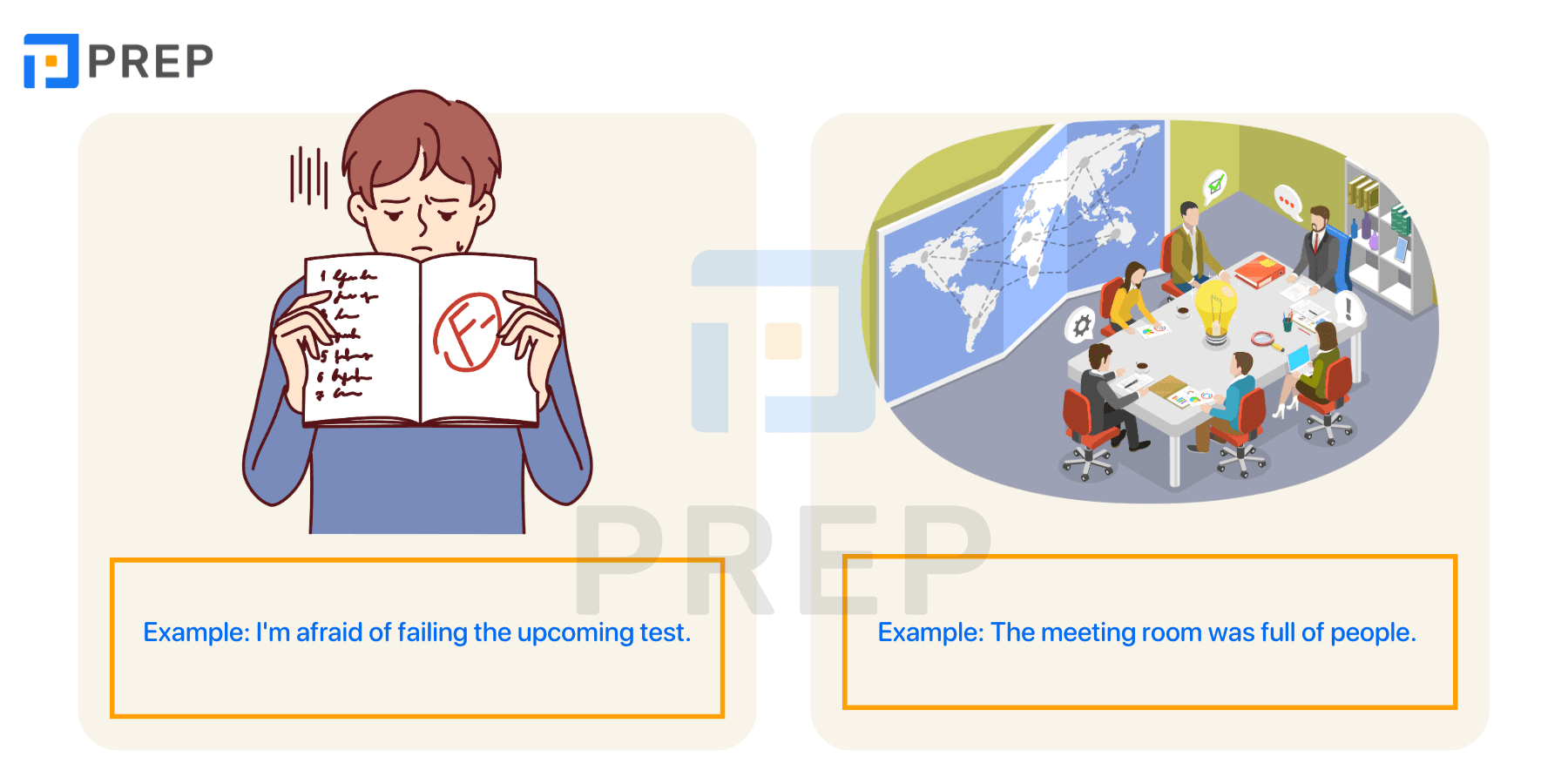
8. Adjective followed by preposition "on"
Adjective followed by preposition "on" include the following basic words:
|
Adjective followed by preposition "on" |
Pronunciation |
Meaning |
Adjective and preposition examples |
|
Based on |
/ˈbeɪzd ɒn/ |
if one thing is based on another, it uses it or is developed from it |
My book is based on my personal experiences. |
|
Dependent on |
/ˌdiˈpendent ɒn/ |
needing somebody/something in order to survive or be successful |
The family's living expenses dependent on me. |
|
Focused on |
/ˈfoʊkust ɒn/ |
with your attention directed to what you want to do; with very clear aims |
Focus on your career, don't fall in love yet. |
|
Keen on |
/ˈkiːn ɒn/ |
wanting to do something or wanting something to happen very much |
Holly is keen on basketball. |
|
Located on |
/ˈloʊkeɪtɪd ɒn/ |
if something is located in a particular place, it exists there or has been put there |
My company is located on the city center. |
|
Short on |
/ˈʃɔːrt ɒn/ |
measuring or covering a small length or distance, or a smaller length or distance than usual |
I have short experience on the technology field. |
9. Adjective followed by preposition "in"
Adjective followed by preposition "in" include the following common words:
|
Adjective followed by preposition "in" |
Pronunciation |
Meaning |
Adjective and preposition examples |
|
adept in |
/əˈdɛpt ɪn/ |
good at doing something that is quite difficult |
Mick is adept in mathematics. |
|
anxious in |
/ˈæŋɡʃəs ɪn/ |
feeling worried or nervous |
My boyfriend is anxious about his job. |
|
confident in |
/kənˈfɪdənt ɪn/ |
feeling sure about your own ability to do things and be successful |
Laza was confident in her management abilities so she applied for this position. |
|
delighted in |
/dɪˈlaɪtɪd ɪn/ |
very pleased |
Finn is delighted in the results he has achieved after many years of striving. |
|
Experienced in |
/ɪkˈspɪərɪənst ɪn/ |
having knowledge or skill in a particular job or activity |
Bevis has experience in implementing SEO strategies so he was assigned to be in charge of this project. |
|
interested in |
/ɪntrɪstəd ɪn/ |
giving your attention to something because you enjoy finding out about it or doing it; showing interest in something and finding it exciting |
I was interested in this book so I bought it. |
|
involved in |
/ɪnˈvʌlvd ɪn/ |
taking part in something; being part of something or connected with something |
The work I am doing is very much involved in the English language, so I can apply my university major knowledge. |
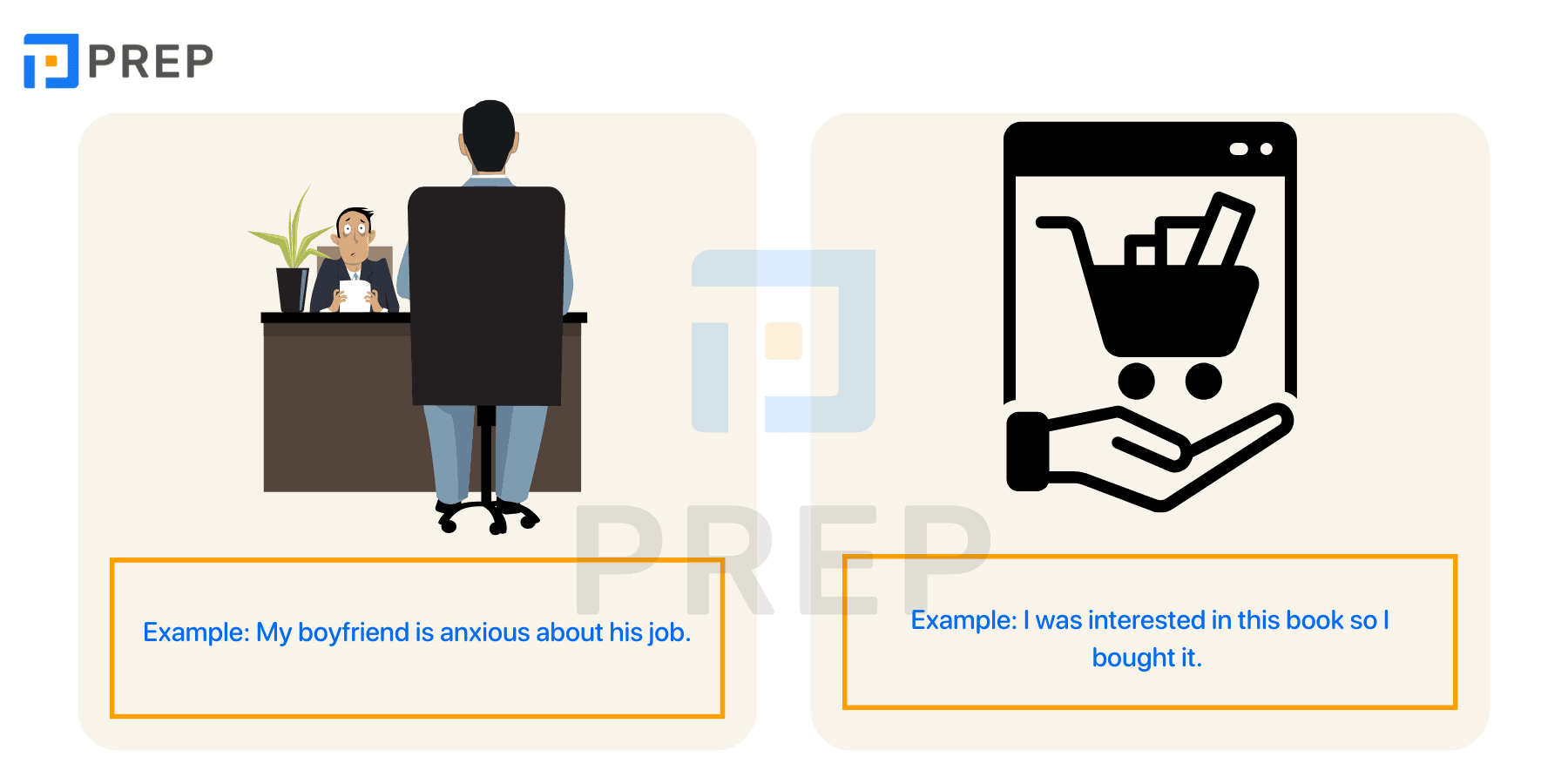
10. Adjective followed by preposition "with"
Here is a list of adjectives commonly used with the preposition "with" that you should know:
|
Adjective followed by preposition "with" |
Pronunciation |
Meaning |
Adjective and preposition examples |
|
Acquainted with |
/əˈkweɪntɪd wɪð/ |
familiar with something, having read, seen or experienced it |
I am acquainted with the subject so my presentation was very effective. |
|
Annoyed with |
/əˈnɔɪd wɪð/ |
slightly angry |
I'm annoyed with my neighbor for always playing loud music on weekends. |
|
Associated with |
/əˈsoʊsieɪtɪd wɪð/ |
if one thing is associated with another, the two things are connected because they happen together or one thing causes the other |
Lung cancer is associated with smoking. |
|
Bored with |
/bɔːrd wɪð/ |
feeling tired and impatient because you have lost interest in somebody/something or because you have nothing to do |
Hella is bored with her 3 year relationship and she is breaking up this weekend. |
|
Busy with |
/ˈbɪzi wɪð/ |
having a lot to do; perhaps not free to do something else because you are working on something |
I'm busy with work so I don't have time to date. |
|
Careless with |
/ˈkeːrləs wɪð/ |
not giving enough attention and thought to what you are doing, so that you make mistakes |
She was careless with the reported data so now she is being reprimanded by her boss. |
|
Clever with |
/klɛvər wɪð/ |
quick at learning and understanding things |
Uri is clever with her partners so she gets a trillion-dollar contract. |
|
Comfortable with |
/kəmˈfərtəbəl wɪð/ |
making you feel physically relaxed; pleasant to wear, sit on, etc. |
I am comfortable with my colleagues so everyone loves me very much. |
|
Coordinated with |
/koʊˈɔːrdəneɪtɪd wɪð/ |
to organize the different parts of an activity and the people involved in it so that it works well |
My company cooperates with a third party to implement this project for customers. |
|
Crowded with |
/ˈkraʊded wɪð/ |
having a lot of people or too many people |
My Dinh stadium was crowded with fans. |
|
Satisfied with |
/ˈsætisfaɪd wɪð/ |
pleased because you have achieved something or because something that you wanted to happen has happened |
I am satisfied with my current job so I will stay with the company for a long time. |
II. Tips for effectively learning adjectives with prepositions
To effectively memorize which adjectives are used with specific prepositions, you need to use them frequently and apply them in specific real-life situations. Here are some tips to help you efficiently study this topic. Remember to save and apply them!
1. Learn through real-life practice
Learning through real-life practice is the first effective method to approach language learning. To remember and use adjectives with prepositions, you should regularly use them in conversations or replace fixed words in your writing. You can divide them into specific prepositions, as mentioned in section 2 PREP, to learn them one by one and avoid confusion.
2. Learn through books, newspapers, and movies
Books, newspapers, and movies are valuable English learning resources that can help you learn more vocabulary and expressions from native speakers. Take the opportunity to read English books and newspapers on topics relevant to everyday life. This will help you understand how native speakers naturally use adjectives with prepositions.
Additionally, watching movies not only provides entertainment but also enhances your ability to use and remember adjectives with prepositions in natural conversational settings. During your learning process, take clear and systematic notes in a separate notebook and review them whenever you have free time.
3. Learn with PREP
At PREP, there are courses available that cover the basics to advanced levels of adjectives and prepositions in English. If you want to approach a new, effective learning method with a specific learning roadmap, consider exploring the courses offered at PREP.
Moreover, the grammar courses at PREP provide interactive and visual exercises during the learning process, making it easier for learners to comprehend and understand the knowledge deeply. Not only that, but the amount of exercises in the final test or mini tests helps you reinforce your in-depth understanding, with detailed explanations of the answers.
III. Adjectives and prepositions exercises
To effectively remember adjectives with prepositions, take the time to practice grammar exercises extensively. Let’s practice adjective plus preposition exercises to help you quickly reinforce your knowledge:
Exercise: Fill in the appropriate prepositions in the following blanks:
-
My father is interested________go fishing.
-
Ha Noi city is famous________ancient cultural architecture.
-
Doctors warn people of the cancer risks related________smoking.
-
Linda is very proud________her son, he studies very well.
-
My best friend is very excited________the wedding
-
Clera is afraid________snakes
-
David is extremely good________Literature.
-
Singapore culture is very different________Indian culture.
-
After moving to the new company, I have become acquainted________my colleague.
-
Eating too much fast food is not good________your health
Answer keys:
|
1 - in |
2 - for |
3 - to |
4 - of |
5 - about |
|
6 - of |
7 - at |
8 - from |
9 - with |
10 - for |
This article has provided over 400+ of the most common adjectives with prepositions that you should remember. Practice using them extensively to enhance your long-term memory.

Hi I'm Chloe, and I am currently serving as an Product Content Administrator at Prep Education. With over five years of experience in independent online IELTS study and exam preparation, I am confident in my ability to support learners in achieving their highest possible scores.
Comment
Premium content
View allPersonalized roadmap
Most read












